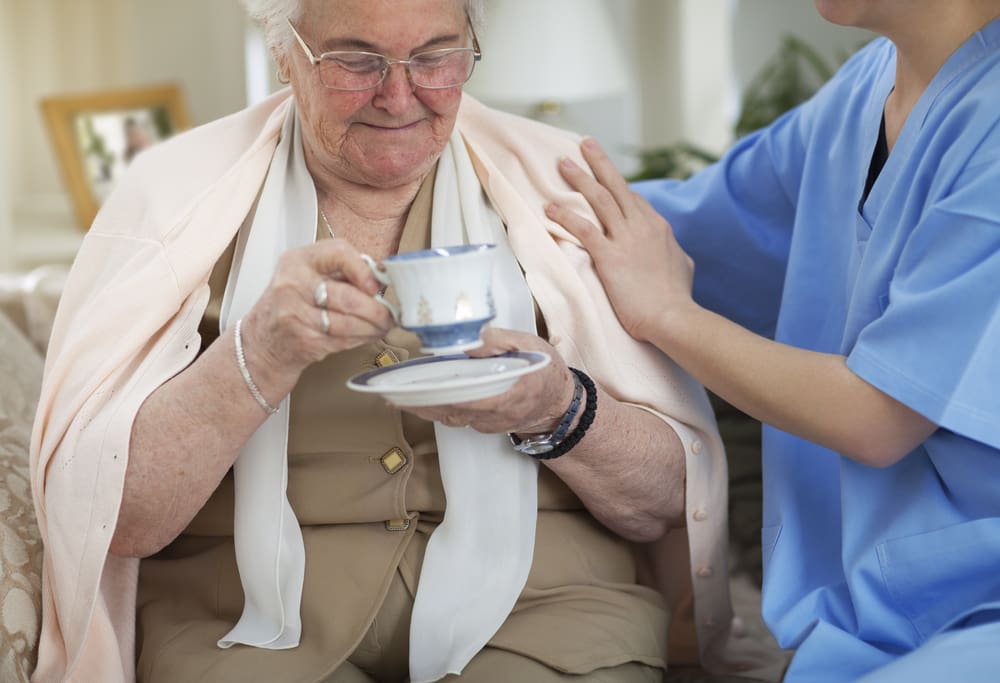5 ways live-in care supports privacy for older people
One of the unique and highly beneficial aspects of live-in care is its ability to provide a greater degree of privacy for older people. Preserving privacy is not just about maintaining physical boundaries but also about upholding dignity and autonomy, especially for older adults.
From personalised assistance to fostering a sense of control, live-in care offers a unique advantage in safeguarding privacy within the familiar confines of one’s home.
Here we explore some of the ways live-in care helps support privacy and why this is so important for enabling older people to maintain the best possible quality of life.
Understanding live-in care
Live-in care entails the presence of a professional caregiver residing with the client in their home, delivering continuous care and support. This arrangement offers personalised assistance within the familiar surroundings of the client’s home, empowering them to live life their way with the support of a dedicated carer.
Through our live-in care service, a highly trained carer provides many services tailored to the client’s specific needs and lifestyle. This may encompass assisting with daily activities such as personal care, mobility support, medication management, meal preparation, and light household duties.
Our live-in care is designed to accommodate our client’s individual needs, enabling them to maintain their lifestyle with dignity and independence. We prioritise flexibility, ensuring that our care evolves alongside each client’s changing circumstances while consistently upholding principles of compassion and respect.
What is privacy in care?
Privacy and dignity form the cornerstone of compassionate care and support, particularly in the realm of personal care for individuals with complex needs. It entails providing individuals with the space and respect they deserve while receiving support in their own homes. Central to this concept is the acknowledgement and honouring of each person’s individuality, empowering them and uplifting their sense of self-worth.
At The Good Care Group, we recognise that respecting privacy in care involves more than just physical boundaries; it encompasses embracing individuals’ views, choices, and decisions without presumptions. It requires approaching each interaction with care and compassion, fostering direct communication, and avoiding assumptions about needs or preferences.
By prioritising these values, we foster a culture of empathy, compassion, and understanding that positively transforms lives, preserving dignity in every aspect of health and social care.
How live-in care reinforces privacy for older people
These are 5 of the most significant ways that live-in care helps support privacy:
1. Personal hygiene and administration
Live-in care ensures only a limited number of trusted individuals will assist with your loved one’s sensitive tasks surrounding hygiene and administration.
A small, dedicated care team of two will support your loved one around the clock on an ongoing basis, assisting with personal matters such as washing, toileting, medication management and correspondence.
Our carers understand the importance of respecting the individuality and privacy of those we care for. We acknowledge that each person has their own sense of modesty and dignity. That’s why we make a conscious effort to maintain their privacy during personal care routines.
This approach helps build trust between the carer and care receiver in a way that residential care (which typically relies on cyclical rota patterns) cannot.
2. Home and possessions
Live-in care also means your loved one’s home and personal possessions will only be accessible to a few trusted individuals.
Moving into residential care often requires a significant cut-back of items owned. As such, this process could involve family members or close friends helping older people sort through personal possessions in order to decide what can stay.
Live-in care keeps your loved one in their own home, where it’s likely that only minor lifestyle changes will be required. And, unlike residential care, only two care professionals will visit their space over the course of a typical day, ensuring greater privacy and peace of mind.
We understand the importance of respecting personal boundaries. Our carers never rummage through our clients’ clothes or belongings without permission. Even for innocuous tasks like locating items in the room, we always ask permission first, prioritising the individual’s comfort and privacy above all else. Your loved one’s possessions are sacred, and we treat them with the utmost care and respect at all times.
3. Receiving visitors
Live-in care helps your loved one maintain a personal space that they’re able to make their own decisions about, e.g. which visitors to receive and when.
Care home visiting rights are protected under both UK and EU law. However, visitors may be encouraged to stop by within certain windows of time in order to adapt to the facility’s schedule.
Live-in care also enables older people to host visitors in a private living space. In residential care, the choice is often between a public living space and a private bedroom.
4. Avoiding scams and fraud
It’s a sad fact that older people are at greater risk of scams and fraudulent financial requests. However, live-in care helps provide an additional layer of protection against this.
Your loved one’s live-in care team will keep an eye on the day-to-day situation. Should any suspicious third-party activity arise, our team promptly addresses the situation, either by directly informing the individual under our care or reaching out to a trusted individual on their behalf.
This proactive approach ensures that sensitive information, including personal data and finances, remains shielded from potential scams and fraudulent requests. With live-in care, your loved one gains an additional layer of protection, allowing them to age with confidence and peace of mind.
Learn more about helping older adults protect against scams and fraud.
5. Familiar surroundings
Live-in care ensures that older adults can stay in the familiar surroundings of their own home. This familiarity plays a crucial role in enhancing privacy for several reasons. Being in their own home allows older adults to maintain a sense of comfort and control over their living environment. They can arrange their space according to their preferences and maintain routines that contribute to their sense of privacy.
Additionally, each home is unique and holds sentimental value for its occupants, allowing older adults to retain their personal space filled with memories and possessions that contribute to their sense of identity and privacy.
Living at home promotes independence by allowing older adults to make decisions about their daily activities, social interactions, and lifestyle choices. This independence fosters a sense of privacy and autonomy, empowering them to live life on their terms.
Live-in care preserves the familiar environment of an older adult’s home, promoting comfort, control, and independence, contributing to their overall sense of privacy and well-being.
Tips for promoting privacy and dignity in care
Promoting privacy isn’t just for professional carers. Everyone looking after the well-being of an older or vulnerable adult can use the following actionable tips to enhance privacy and dignity in the care they provide:
- Provide choice: Empower individuals by offering them choices and respecting their preferences regarding their care. This fosters autonomy, trust, and respect.
- Be an attentive listener: Engage in meaningful conversations and actively listen to individuals’ concerns and preferences. Prioritise their requests, even when you’re busy with other tasks, to demonstrate care and build trust.
- Read their body language: Pay attention to non-verbal cues to understand individuals’ comfort levels and emotions, especially when providing personal care. Approach situations with empathy and sensitivity to create a safe and comfortable environment.
- Respect Their Opinions: Set aside personal beliefs and engage in conversations to understand individuals’ philosophies and values. Respect their religious and cultural preferences without criticism or judgement.
- Maintain personal space: Show respect for individuals’ personal space and belongings. Ask for permission before moving items and ensure everything is returned to its original place after cleaning to promote comfort and respect.
- Maintain confidentiality: Prioritise their privacy and confidentiality by refraining from sharing personal health information without consent. Uphold trust and respect by keeping medical information private at all times.
Award-winning live-in care from The Good Care Group
With a focus on preserving dignity, promoting independence, and enhancing quality of life, our team of highly-trained carers go above and beyond to meet the unique needs of each individual we serve.
By prioritising privacy, fostering meaningful connections, and upholding the highest standards of professionalism, we strive to create a nurturing environment where older adults can thrive.
If you’d like to find out more about how live-in care supports privacy for older people, contact our friendly team today.
Discover more
Laura Davies supports Who Cares Wins! as Ambassador Endorser
We’re proud to share that Laura Davies, Chief Operating Officer at The Good Care Group, is supporting Championing Social Care this year as an Ambassador Endorser for their national conference, Who Cares Wins! Laura has been an ambassador for Championing...
Read moreThe Good Care Group partners with Age Scotland
We are proud to announce that The Good Care Group is now an Associate Group Member of Age Scotland, the national charity for older people. By joining Age Scotland’s community we are strengthening our commitment to supporting older adults across...
Read moreEnhancing independence by partnering with Mobility Hire
At The Good Care Group, we believe that staying in the home you love should never mean compromising on your independence. Our mission is to provide outstanding live-in care that empowers our clients to live life on their own terms....
Read moreRead why our clients choose us
Awards & accreditations
Talk to us about your care needs
To talk about your care needs, contact one of our friendly advisors.
Calls from landlines are free.












